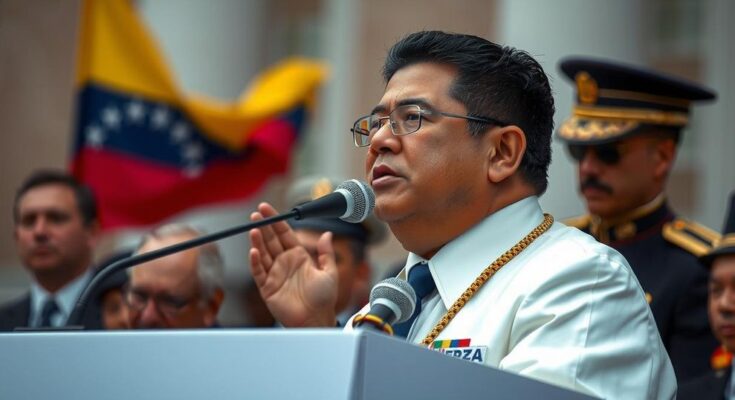Nicolás Maduro was sworn in for a third term as Venezuelan president despite allegations of electoral fraud. The opposition, led by González, has claimed victory backed by evidence, while Maduro’s government continues to assert authority in a repressive environment. International recognition of Gonzalez as president-elect complicates the political landscape, with major implications for Venezuela’s democracy.
On Friday, Nicolás Maduro was inaugurated for a third term as the president of Venezuela, amidst allegations of electoral fraud and without providing substantiated proof of his claimed victory. This marks a continuation of his increasingly authoritarian regime that has persisted for more than a decade. The election, widely regarded as one of the most significant cases of electoral fraud in recent Latin American history, faced opposing claims backed by various voting center receipts collected and verified by independent observers, suggesting that the opposition candidate, González, likely won the election with a significant margin.
This situation has raised concerns regarding the implications for democracy in the region. Carolina Jiménez Sandoval, president of the Washington Office on Latin America, stated that Venezuela exemplifies a “dangerous precedent” indicating a blatant disregard for the electorate’s will. While several nations, including the United States, have recognized González as the legitimate president-elect, his return to Venezuela is complicated by threats from Maduro’s administration and a substantial reward for his arrest.
As the inauguration proceeded, Maduro’s government executed measures to limit opposition influence, including border closures and a showcase of military strength. Several Latin American leaders have also refrained from attending Maduro’s inauguration, opting instead to send representatives. The political landscape remains complex, with the support for González continuing to build despite efforts to intimidate and undermine opposition forces.
The incoming Trump administration faces a pivotal decision on how to address Maduro’s regime, considering past heavy sanctions had not succeeded in achieving desired political change. Analysts caution that the ineffective previous strategy might embolden Maduro further, while the Biden administration had recently attempted a fresh approach by easing sanctions in exchange for electoral commitments, a plan that ultimately failed due to Maduro’s oppressive tactics against opposition candidates.
Despite considerable obstacles, opposition supporters demonstrated resilience, collecting more than 85 percent of voting receipts indicating that González secured significantly more votes than Maduro. The U.S.-based Carter Center affirmed the legitimacy of these records, further asserting evidence of the opposition’s claims.
The political situation in Venezuela has been marked by significant turmoil, particularly under the leadership of Nicolás Maduro, who has faced accusations of electoral fraud throughout his tenure. The recent elections have underscored the ongoing struggle between Maduro’s government and the opposition, which has sought to reclaim democratic sovereignty. Key players in this conflict include international powers, numerous Latin American leaders, and organizations monitoring the electoral process. The engagement of the U.S. and its diplomatic strategies remains critical due to the geopolitical implications of Venezuela’s internal strife and human rights concerns.
In summary, Nicolás Maduro’s inauguration for a third term is overshadowed by serious allegations of electoral fraud and challenges to democratic governance in Venezuela. The opposition, which claims a rightful victory through verified voting receipts, continues to garner international support. Diplomatic efforts and recognition of the rightful leadership play a crucial role in this ongoing conflict, and the recent approaches by U.S. administrations illustrate the complexities faced in addressing Venezuela’s political crisis. The future trajectory of Venezuela’s democracy hangs in a precarious balance as global leaders observe developments.
Original Source: www.washingtonpost.com




